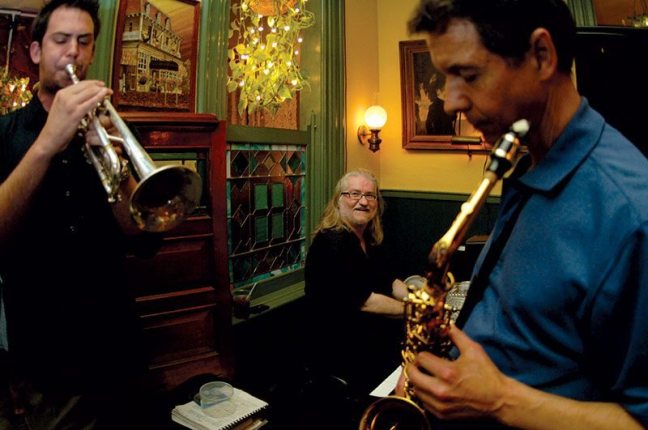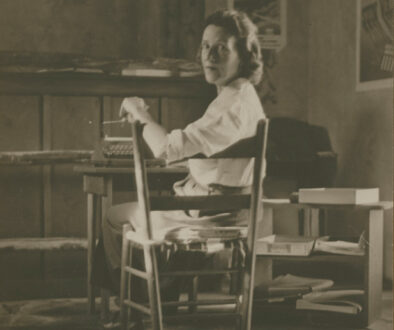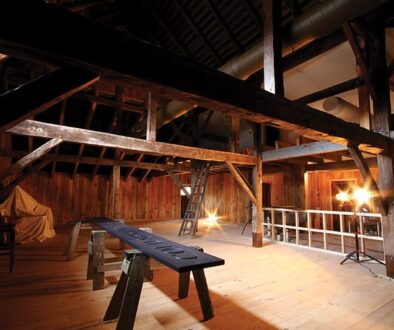The Beat Goes On
For anyone who knew George Mesterhazy, not a day goes by that we don’t think about this extraordinary man who left us too soon. It’s inconceivable that four years have passed, because every day it seems like it was yesterday that our collective worlds fell apart, paralyzed by the news of his death.
We were drawn to the Merion Inn that April morning, just days after a merry band of us had descended upon him to raucously celebrate his birthday around that Steinway. It was Easter Sunday. George was in fine form, on and off the keyboard. He made some outrageous private remarks—he always did; but he also talked in a mystical way about how wonderful his life was and how the only reason to play music was for the love of it. We gathered at the piano and asked him to play The Godfather theme, then we used that tune to make up a crazy version of Happy Birthday and sang it to him. As always, he was lavish in his affection, telling people he loved them, never leaving anything unsaid. We said our goodnights, peppered back and forth with the usual playful expletives, and curiously, that night we also made promises to each other that we would record some songs. Soon. We had no idea this was goodbye.
There was so much George wanted to do. So many people he wanted to work with, to mentor, to produce and accompany regardless of their resume. Who knew that exactly one week later, we would be gathered with a few thousand mourners at the Middle Township Performing Arts Center to memorialize and celebrate his life and irrepressible talent?

Fellow musicians assembled and paid tribute to their friend—among them, Bandleader Barry Miles; Bob Ferguson, Dean Schneider, Bob Rawlins, Derrick McQueen, David O’Rourke, Joe Barrett; two-thirds of his Merion jazz trio, Tim Lekan and Bob Shomo. The Paulas were there too. Paula West in from San Francisco where she and George performed annually at the Nikko Hotel and also at NYC’s Algonquin Hotel. Paula Johns sang, honoring the man who she’d been in concert with (literally and figuratively) for three decades. Every second of that afternoon of music and tributes moved us. We held onto each other and wept – for George, for each other and for Vicki Watson, George’s long-time companion and muse, owner of The Merion Inn, and an arranger and vocalist in her own right.
What was to come next at The Merion? How do you move forward when everyone is frozen with grief? Would the music continue?
The answer was and is, an unqualified Yes! The “way through” came from Cape May’s Mid-Atlantic Center for the Arts and Humanities (MAC), whose upcoming music festival presents the Fifth Annual George Mesterhazy Tribute Concert on June 12th at Convention Hall.
George played concerts for MAC’s festival over the years, incorporating the music of the Great American Songbook and performing at the First Presbyterian Church and other smallish venues. But in 2012, he was scheduled to play in the newly opened, much larger Convention Hall.
After George’s passing, MAC contacted jazz pianist Barry Miles, his friend and collaborator since 1975. “I was subbing for George at the Merion back then. After George died, MAC called and asked if the concert could continue and would I be willing to be the Music Director. Of course, I said yes.” Miles contacted all of the players and each agreed that the concert had to go on. The themed concerts have continued year on year, using an approach that was pure George. From the Great American Songbook to dance to orchestral productions, George was interested in anything that meant collaboration with the musicians he so esteemed.
The 2016 concert is perfectly themed: “May the Music Never End” (Shirley Horn’s last CD with George), and will feature singers and instrumentalists who worked with him. It will be a program of vocal and instrumental music arranged by George, with remarks by the performers about the process of working with him – Paula Johns, Paul Jost, Joe Barrett, Paul West, Jerry Boyle and Melanie Rice. The remarks will undoubtedly be imbued with George’s very particular sense of humor, his warmth, his musical genius, and his unbounded generosity. These are all wells that many have plumbed and enjoy to this day. They connect so many people to George and to each other. They are his theme and his legacy.
It’s a theme that has been expressed many times and in many ways. Vicki Watson described George’s passions about music: “George loved collaborating, he loved being an accompanist, he loved the relationships and the alchemy created between the singers and instrumentalists.”
It was at The Merion Inn that George’s light shone bright for musicians and patrons alike. He sat at the beautiful Steinway nearly every night of the week, serenading the crowd with his treatments of every style of music imaginable. Thousands upon thousands of songs wafted through The Merion. And on the Jazz Nights he shone brightest.

The music was not background music. It was never “wallpaper” as it is sometimes considered by some venue owners and patrons. The Merion on these nights became a listening room, and drew intentional listeners—most nights, wall-to-wall listeners, and Vicki Watson was acutely aware of the draw. “George attracted and educated the audiences about music. Our customers are sophisticated and they like the Great American Song Book music. George had introduced them to a lot of it, and he liked how interactive and immediate the music was. Now, our pianists [Barry Miles, Dean Schneider, John Pruitt and Frank Strauss] like coming to play at The Merion because of the way the audience respects the music.”
It was in his role as mentor and educator that George impressed Bob Rawlins, a friend and colleague of George’s, who sometimes played alto sax on Jazz Nights. A phone call about George having died stopped him in his tracks in the middle of New Orleans. Dr. Rawlins most recently had worked with George at Rowan University in Glassboro, where he is a professor of Music Theory.
In any “George conversation” there is always a delicious story, and Bob’s was no exception. “We needed to hire a jazz piano instructor at Rowan, and I really wanted to hire George. I thought he’d be perfect. But you have to have a Master’s Degree to teach on that level, and George didn’t have a PhD. He also didn’t have a Bachelor’s Degree or a high school diploma! So, without those he needed a letter of justification, so I wrote it and he got in. And he was perfect.”
Nancy Rawlins, professor of organ and music theory at Rowan University (and Bob’s wife) recalls Jazz Night as “George’s Night.” “He played every other night of the week, but he looked forward to being refreshed by playing jazz with other musicians, creating something magical and spontaneous. Although he had a basic ‘plan’ in his head, he trusted the collaborative efforts of whoever was playing that night. After a brief ‘talk-through’ he’d end with: ‘Let’s just see how it comes out.’ George would always make sure it wouldn’t just ‘come out.’ He was right there studying what the players were doing, listening, responding, holding it together and driving the ensemble to the end, signaled with his special smile or laugh.”
Dean Schneider, one of the regular piano players at The Merion, articulates the vibe that George brought to Jazz Night. “You knew something special was about to happen, all the ingredients right in front of us, the people have arrived, the energy in the room is electric and kindness abounds. Jazz Night becomes ‘Cloud Nine’ for the musicians and the observers. George’s vision, generosity, musicianship, diplomacy and honesty made for an experience that became an event.”
After George’s death, Vicki wasn’t sure she could keep the music going, though she knew how important it (and especially Jazz Night) had become to the musicians and patrons. “I couldn’t keep it going by myself. At that point, I needed the musicians to do it, and they did. I’m really grateful for that. It was also fortunate that my business partners, Victor Keen and Jeanne Ruddy, were big fans of George’s, so they also wanted the music to continue.”
And so it does, in a little town where there is a vibrant live music scene. Vicki sees the “cross-pollination” of so many singers and players as fostering the development of venues throughout Cape May. George probably never fully realized the impact he had on people, and especially on those he encouraged and supported. As Barry Miles so rightly said, “George didn’t like all music, but if you were serious and wanted to learn and grow, he respected you.”
George often sat in with a group of us who were awed by his level of musicianship. Barry Tischler, local entrepreneur and crooner, was one of our group. “We all know what a great musician George was. He played Carnegie Hall on an album with Shirley Horn that was nominated for a Grammy. His real gift was how he made you feel. It carried over into the musician community in Cape May, and he treated us like we were on his level.”
Terry Dougherty, local bass player and member of the Herb Moore Trio, met George in 1997 and immediately connected with him. “I hadn’t played bass in a long time and George didn’t have his grand piano yet, just the old upright. He got a book of Pat Metheny music and we spent days reading through it. He was a great mentor and was sincerely encouraging. Years later, Herb Moore and I were playing at the gazebo in Cape May and asked George to join us. Five minutes before the gig started, here comes Georgie with his iPad. He pops up and starts playing Hammond B3 and grand piano sounds on this virtual keyboard. Our jaws dropped. The man could make music on anything!”
The 5th Annual George Mesterhazy Tribute Concert will showcase all of the wonder and love that George brought to us. Paula Johns, who has collaborated with George since the late 80’s, says it best: “George was always encouraging and challenged me to grow on every song I sang. He told me not to imitate anyone! He’d say, ‘Come up with your own musical style and only do what you know how to do! Take chances, push yourself, get out of your mind and sing from your heart. Be willing to make a fool out of yourself, make mistakes. You are still only you and people will love you. Honesty is what people remember.’”



